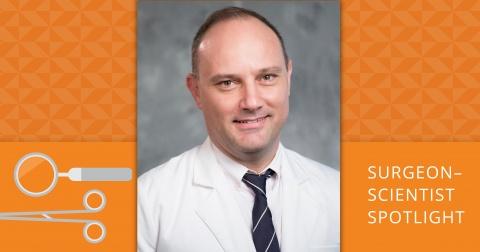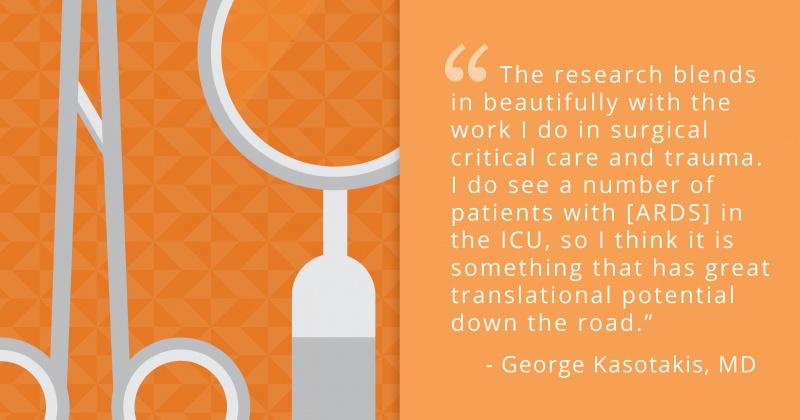
When George Kasotakis, MD, MPH, moved to Durham from Boston University Medical Center in September 2018, he brought with him a strong research background in pulmonary inflammatory disease, including acute respiratory distress syndrome (ARDS). As an Assistant Professor of Surgery in the Division of Trauma and Critical Care Surgery, Dr. Kasotakis’ clinical interests have the same focus: severe ARDS, which occurs when fluid fills the air sacs of the lungs due to inflammation. Dr. Kasotakis studies the pathogenesis of ARDS to determine common triggers, and in the future, how to prevent these triggers from becoming a catalyst of the disease process.
“At this stage, I am looking at ARDS in mice, through mechanistic experiments,” says Dr. Kasotakis. “I’m hoping eventually to take that over in a translational aspect to human-based studies, to study the disease here at Duke, and hopefully later on, around the country. We have an IRB protocol to do some translational work next year. We would be recruiting patients that have gram-negative pneumonias, with ARDS, and patients with gram-negative pneumonia without ARDS, and collecting and analyzing clinical samples from each group.”
These biosamples, including fluid collected from bronchoalveolar lavage, a process which intentionally puts fluid into the lungs and collects it back for examination, will compare the two patient populations—those with ARDS, and those without. The Kasotakis Pulmonary Inflammation Laboratory is dedicated to the current research and these future endeavors.
“First, we will analyze the samples and try to determine whether what we have identified as triggering the disease process in mice, the molecular mechanisms and signaling pathways, are similar in humans. Any inflammatory disease can cause ARDS: sepsis, trauma, severe infections, multiple transfusions, drowning, anything you can imagine that triggers the immune system. Second, we want to see if there are any other differences between humans with ARDS and those without it, with the same underlying disease process. Once we identify some of those key proteins or pathways that seem to be involved in the pathogenesis of the disease, we can target those pharmacologically and hopefully come up with treatments that are efficient and effective in humans.”
Within the next year, Dr. Kasotakis will begin this research with consenting patients. Currently, the department has provided start-up funding for his research, and he has applied for a K-award to cover future costs.

While part of Dr. Kasotakis’ effort is dedicated to this research, trauma knows no time restraints. Striking the right balance between his research time and patient care can be challenging, Dr. Kasotakis admits, but he has been able to do walk this tightrope successfully with some preemptive strategies.
First, his research interest in inflammatory pulmonary disease and ARDS is in direct correlation with his clinical interests. What he does in the clinic informs his scientific research, and vice versa.
“The research blends in beautifully with the work I do in surgical critical care and trauma,” he says. “What I’m studying in the lab meshes very nicely with my clinical interests. I do see a number of patients with the disease process in the surgical intensive care unit, so I think it is something that has great translational potential down the road.”